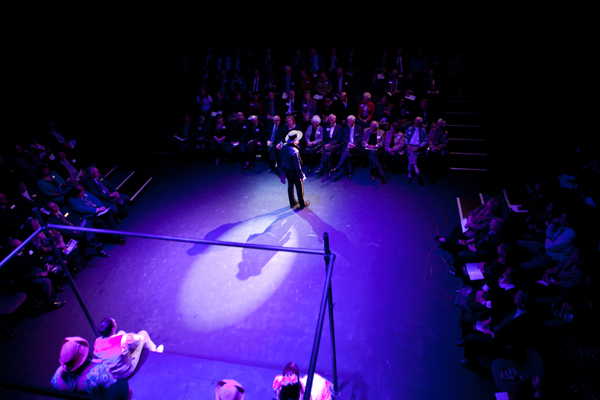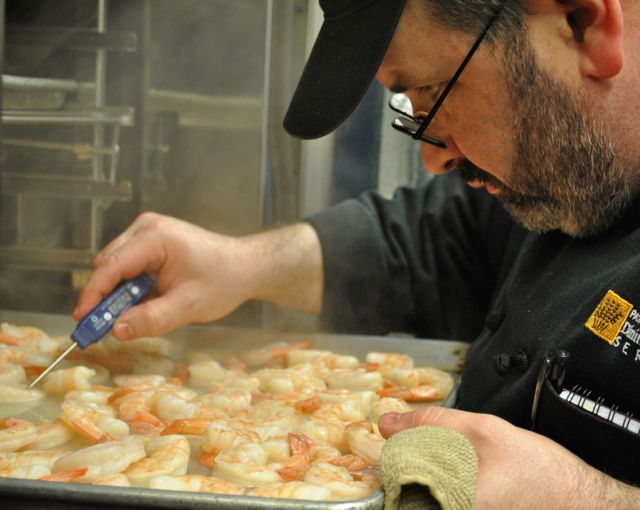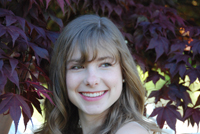Page 49 • (495 results in 0.138 seconds)
-

STAGE There’s a lot of prep behind the scenes. It takes months to write and develop scenarios. After tweaks, the scenario is programmed into the manikin’s operating system, which communicates through the computer in the control room. However, scenarios might be adjusted further based on student responses and reactions. “I’m constantly troubleshooting to make the scenarios better,” says Jodi Kushner, the simulation director for the Clinical Learning and Simulation Center. The current cast of
-
board, for example, or hang lights, even run a table saw to help build a set. The more opportunities to get involved, to collaborate with each other, the more prepared students will be. That was certainly true for Mariah Madden ’14. As part of her final for her computer-aided design course, Sweger had Madden put into practice lighting ideas on which she was working for last season’s finale, “The 25th Annual Putnam County Spelling Bee.” As acknowledgement of her work, Sweger made sure Madden was
-
languages as a requirement for students in business or nursing or other fields of study. But, when I heard about this, I was like, no way. Languages are at the core of the liberal arts, at the core of us as humans, because, as a colleague of mine pointed out, while we’re sitting here talking about this, I’m not speaking to you in numbers, or in computer code, or anything else. I’m using metaphors and words… language. I am weaving a narrative. It seems so obvious, so fundamental, to hold on to (and
-
more flexible. Increased reliance on computer-assisted instruction is likely to intensify this distinction. Also, language must be codified and reduced to a set of rules if teachers are to have any hope of explaining them to students. This model corresponds somewhat to the Saussurean distinction between langue and parole. Langue represents the idealized, abstract system that constitutes a given language, whereas parole is any one particular speaker’s appropriation and implementation of that system
-

example, or hang lights, even run a table saw to help build a set. The more opportunities to get involved, to collaborate with each other, the more prepared students will be. That was certainly true for Mariah Madden ’14. As part of her final for her computer-aided design course, Sweger had Madden put into practice lighting ideas on which she was working for last season’s finale, “The 25th Annual Putnam County Spelling Bee.” As acknowledgement of her work, Sweger made sure Madden was listed alongside
-

will continue as a university priority for the immediate future. The transformed center will provide 88,500 square feet of classroom and research space for biology, chemistry, computer science, geosciences, physics and environmental studies. Among the projects planned for Rieke that were completed during the campaign was the Louis and Lydia Sheffels Biology Laboratory. It was made possible by the support of Carol (Sheffels ’58) Quigg, Jerry Sheffels ’54 and the entire Sheffels family. Carol Quigg
-

PLU Named Best Option for Financial Aid in Washington LATEST POSTS Summer Reading Recommendations July 11, 2024 Stuart Gavidia ’24 majored in computer science while interning at Amazon, Cannon, and Pierce County June 13, 2024 Ash Bechtel ’24 combines science and social work for holistic view of patient care; aims to serve Hispanic community June 13, 2024 Universal language: how teaching music in rural Namibia was a life-changing experience for Jessa Delos Reyes ’24 May 20, 2024
-

Center,” she added. “I just want to give a shout-out—my heartfelt thanks—to Nick Templeton. He was not only my writing tutor. We became friends.” They’ve even discussed going back to her village to offer workshops there. Read Previous PLU named Top 10 Peace Corps producer in the country Read Next Why PLU grad and entrepreneur still gives back to the School of Business LATEST POSTS Summer Reading Recommendations July 11, 2024 Stuart Gavidia ’24 majored in computer science while interning at Amazon
-

cook for themselves. Some, like applied physics and computer science double major Tim Hurd ’13, who has lived off campus for more than a year, find themselves reinventing the meaning of cooking. Hurd draws his food-spiration from a book his grandma and mom bought him in high school. The book, “A Man, a Can, a Plan,” epitomizes a man’s approach to cooking, with dense laminated cardboard pages and recipes that require a large number of canned and pre-prepared food items – but for Hurd it’s perfect
-

and I knew that the program was well-established and successful. Lastly, but most importantly, I knew that PLU had an extremely strong biology program backed by a wonderful group of dedicated professors who really do care about their students success in courses. To sum this up, by attending PLU I avoided becoming just a student ID number in the computer, but rather I a known recognizable face on my daily visits to Rieke Science Center. My PLU experience: My experience at PLU has been an absolute
Do you have any feedback for us? If so, feel free to use our Feedback Form.


